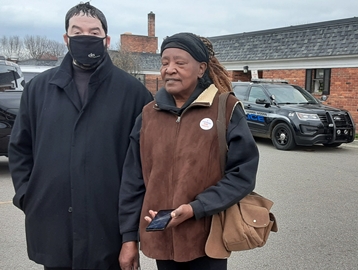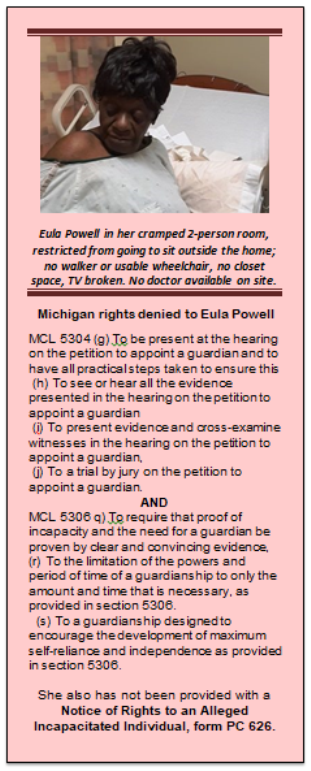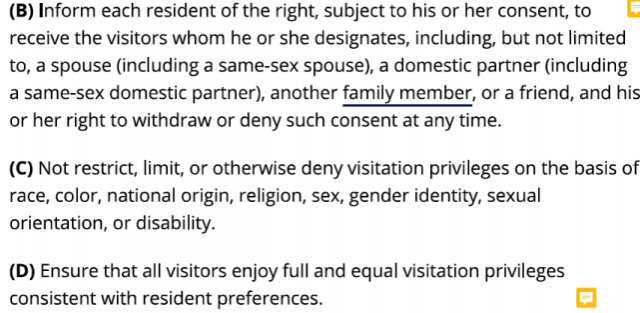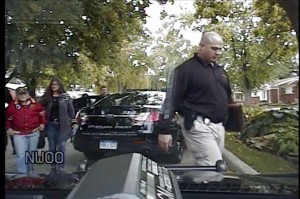
Eula Mae Powell, 85, in court to fight guardian/conservatorship Jan. 18, subject of controversy since denial of visits by long-time friends
Wayne Co. Probate Court Judge Judy Hartsfield considering petition to terminate probate supervision and TRO vs. visit denials; orders guardian from Michigan Guardianship Services
Channel 7’s Investigator Heather Cattallo continues coverage of abuse under state guardianship laws; new reform legislation expected this year
Meanwhile, federal regulations cover the rights of residents in nursing homes in detail, including right of visitation
American Bar Association: Feb. 1 is National Guardianship Abuse Awareness Day
January 21, 2023
By Diane Bukowski

WCPC Judge Judy Hartsfield
DETROIT– Elder Eula Mae Powell, 85, won her first day in court by Zoom Jan. 18, in front of Wayne County Probate Judge Judy S. Hartsfield. She presented her petition objecting to guardianship/conservatorship, and emergency motions for s temporary restraining order (TRO) against a nursing home, police, and guardian who barred visits from her friends.
A second amended filing cited violations of federal laws protecting the rights of residents in nursing homes, including the right to visitors of their choice. (Motions linked below story.)
“This is NOT the last stop in my life,” Ms. Powell told VOD during a visit in her cramped, dingy two-person room at The Orchards of Harper Woods last year. All her life, Ms. Powell was independent and active, working at the Dodge Main Plant, teaching in three school systems, and participating in electoral campaigns including the election of Detroit’s first Black Mayor, Coleman Young. She has regular income from her pensions and Social Security.
“I planned to enjoy the retirement that I earned,” she said.

Rev. Jerome Poole and Call ’em Out’s Agnes Hitchcock after police ejection from visits Nov. 14, 2022.
Judge Hartsfield acknowledged Ms. Powell’s request to take her out of court supervision, and meanwhile allow visits from her friends, after reading a report from appointed Guardian Ad Litem (GAL) Steven R. Geller, but did not grant them immediately.
“Ms. Powell does not like losing her independence,” Geller said in part. “She is upset that she is placed in a facility. She is upset she is not allowed to drive and the car and car keys were taken away, she is upset she can no longer go to the bank and have access to her funds. She wants her car back . . .she also wants her money. Lastly, she hates the facility.”
He reported that Ms. Powell DOES want to see her visitors, including Diane Bukowski and others who have been denied access. They have included Agnes Hitchcock, steward of Call ‘Em Out, and Rev. Jerome Poole. Hitchcock attended the hearing on Zoom, and reiterated her desire to visit.
 Geller, however, claimed in his report that a guardian has the right to determine who can and cannot visit. He said a guardian must approve visits from Bukowski and others who previously attempted to visit.
Geller, however, claimed in his report that a guardian has the right to determine who can and cannot visit. He said a guardian must approve visits from Bukowski and others who previously attempted to visit.
The rights of guardians and conservators are currently subject to much debate nationally, with many states enacting progressive legislation to protect the rights of the people UNDER guardianship and conservatorship. It is expected that four bills enacting reforms will be re-visited in Michigan’s newly-constituted legislature this year. (See Channel 7 report at top of story.)
Geller did cite 700.5306a Rights of individual for whom guardian is sought or appointed, in his report, but did not address whether it has been applied in Ms. Powell’s case. The provisions in the box at left were not carried out.
Judge Hartsfield ordered that an “independent” guardian be appointed, as Ms. Powell’s niece Karen Sue Herbert agreed to withdraw from that position. She indicated the guardian would come from Michigan Guardianship Services. It is not known if it is connected to the Michigan Guardianship Association exposed in Channel 7’s report above. She also ordered a review by an “independent” medical examiner before deciding on Ms. Powell’s request to terminate the guardianship/conservatorship.
Judge Hartsfield ordered Tonia Kimbrough, a social worker from The Orchards at Harper Woods, to report back to Geller in one week regarding setting up “supervised” visits. During the hearing, Kimbrough was inconclusive about whether such visits could be held.
No one representing the Orchards at Harper Woods appeared during the hearing to answer the request for a TRO due to the visit denials, despite having their top officials, including Mark Fuchs, Agent, and Tom Beauvais, Administrator served with a notice.
Bukowski brought Judge Hartsfield’s attention to federal regulations governing the rights of nursing home residents to visits from individuals of their choice, and posting of a home’s policies and regulations including policies on visitation. The following filing is currently included on Ms. Powell’ probate court docket. See: http://voiceofdetroit.net/wp-content/uploads/EULA-MAE-POWELL-Second-Addendum-to-Petition-for-TRO-Petition-v-Guardian-Conservator-Appt-3.pdf.
Among the rights cited in federal law:

 Nursing homes must also have written policies and procedures regarding visitation rights. During attempts to visit by Bukowski and others, copies of such policies were requested, but the requests were ignored. Those denying the visits refused to identify themselves, but claimed Ms. Powell’s guardian did not want them visiting.
Nursing homes must also have written policies and procedures regarding visitation rights. During attempts to visit by Bukowski and others, copies of such policies were requested, but the requests were ignored. Those denying the visits refused to identify themselves, but claimed Ms. Powell’s guardian did not want them visiting.

Conservatorship & Guardianship Abuse Awareness Day (americanbar.org)
Britney Spears and the Netflix movie “I Care a Lot” brought awareness of both abuse of the process of guardianship or conservatorship[1] and abuse by guardians and conservators to the public eye. February 1st is National Conservatorship and Guardianship Abuse Awareness Day, an effort to maintain awareness of the abuse even as Brittney puts her life back together, and memory of the movie fades. Abuse is not just something that happens to celebrities or in the movies.
 My first encounter with abuse by a guardian was when I was clerking in a legal aid program while in law school. I helped a Pro-Bono attorney on a case where the guardian had moved the person out of the only home she had known, held a garage sale, and sold all her possessions, even toys that she had treasured for over 60 years. The client simply wanted her dolls back and we struggled to get the money back.
My first encounter with abuse by a guardian was when I was clerking in a legal aid program while in law school. I helped a Pro-Bono attorney on a case where the guardian had moved the person out of the only home she had known, held a garage sale, and sold all her possessions, even toys that she had treasured for over 60 years. The client simply wanted her dolls back and we struggled to get the money back.
The movie “I Care a Lot” is loosely based on abuse that happened in Clark County, Nevada when criminals[2] looked for isolated adults experiencing neurocognitive decline and railroaded them into guardianship. The guardian then neglected the people and stole every penny they had. While the Nevada case is one of the largest reported scandals, it is far from the only one. Abuse by guardians runs the gamut from physical abuse, forced labor, neglect, abandonment, sexual abuse, psychological abuse, and financial exploitation.

Michigan guardian Mary Rowan was the subject of a series of VOD stories on guardianship abuse (see some links below).
Fundamental due process is often absent from the process of obtaining guardianship of an adult. In many cases, the defendant or respondent is unrepresented and the hearing to restrict or remove their legal and constitutional rights often lasts less than 15 minutes. I observed one jury trial where the “defense attorney” later bragged that he said nine-words in the entire trial.
Guardianship reform is currently dominating the work of the ABA Commission on Law and Aging. We are in the process of writing a Lawyers Handbook on Defending an Adult in a Guardianship Case. We are writing it because it is needed, there is little on the topic, and an increasing pool of lawyers have been inspired to defend adults against guardianship and are taking cases to modify or terminate guardianships. We obtained outside funding from two private foundations to cover the cost of the staff time needed to publish this book.

Gayle Robinson(l) kidnapped from her Westland home of 60 years on Sept. 30, 2014, by Westland police and Mary Rowan aide Katie McDonald, an accountant. The removal violated an earlier order by Judge Terrance Keith that Mrs. Robinson not be taken without his court order. Mrs. Robinson was held in a hospital for an “independent medical evaluation” although her own doctors had certified that she was fully competent. Mrs, Robinson’s home was seized, and she has since been confined and medicated in a series of nursing homes which restrict her visits. See story links below.
The mission of the Commission on Law and Aging is to educate and advocate to protect the rights and dignity of adults as they age. Raising awareness and advocacy for due process rights of adults in guardianship cases, and awareness of the rights and dignity of adults who are experiencing abuse, neglect, or exploitation is fundamental to our work.
The structure of the ABA Center for Public Interest Law, and outside grant and consulting funding makes it possible for us to do this important work. We share this expertise with ABA members through publications, training, and providing technical assistance to ABA members and other professionals who are interested in pushing back against abuse. The ABA Commission on Law and Aging has had a core role in four national summits on guardianship reform and the recommendations of all four summits are reflected in ABA policy.
There are guardianship reform efforts in many states. The Commission on Law and Aging continues to host calls for the Working Interdisciplinary Networks of Guardianship Stakeholders (WINGS) groups in about 25 states, with the goal of helping states determine what needs to change and how to bring about change. As we recognize National Guardianship and Conservatorship Abuse and Awareness Day, we encourage you to examine your own state’s guardianship practices and identify ways in which you can work to ensure that our vulnerable neighbors are not harmed by a system that is supposed to protect them.
Related documents:
Related stories from VOD, which has published many accounts of guardianship and conservatorship abuse since 2014.
Guardianship Rights & Alternatives – Disability Rights Michigan (drmich.org)
**********************************************************************************

 Voice of Detroit is a pro bono newspaper, now devoting itself entirely to stories related to our PRISON NATION and POLICE STATE.
Voice of Detroit is a pro bono newspaper, now devoting itself entirely to stories related to our PRISON NATION and POLICE STATE.
VOD’s editors and reporters, most of whom live on fixed incomes or are incarcerated, are not paid for their work. Ongoing costs include quarterly web charges of $460.00, P.O. box fee of $180/yr. and other costs including utility and internet bills, costs for research including court records and internet fees, office supplies, gas, etc.
Please DONATE TO VOD at:
https://www.gofundme.com/donate-to-vod
************************************************************************************




